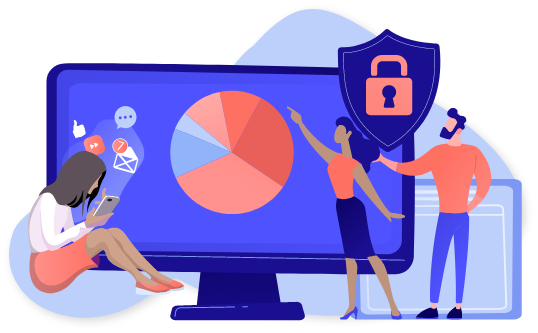Thirteen is an important age for internet users in the United States. Companies generally don’t let 12-year-olds join social media, browse certain websites, or sign up for email addresses—at least not without fibbing about their age.
At 13, kids do not have to lie. It’s natural if parents think the shift relates to 13-year-olds being mature enough to handle internet content. However, the dividing line at 13 relates to the law called COPPA (Children’s Online Privacy Protection Act). COPPA limits what websites and online service operators can do with younger children’s personal information.
COPPA compliance takes a lot of effort. Rather than jump through legal hoops, many websites, apps, games, or services label themselves as not for the under-13 set. Thus is borne the perception that 13-year-olds are mature enough to handle what the internet throws at them.
In reality, many 13-year-olds still need direction and even a little supervision as they navigate adult freedoms online. This guide offers practical tips on internet use for parents of teenagers. It also explains what COPPA is and breaks down what websites and kids can and can’t do “legally” at 13.
Table of Contents
- Practical Internet Use Tips for Parents of Teenagers
- The Current COPPA Law, Simply Stated
- What Kids Can and Can’t Do Online at 13
- What General Audience Websites Can and Can’t Do
- References and Footnotes
- Additional Resources
6 Practical Internet Use Tips for Parents of Teenagers

Teens depend on their devices and the internet to video chat, text, create projects, play games, do homework, and much more. Since they’re older, they want more privacy. That’s normal but can be scary for parents.
1. Stay involved and keep the lines of communication open.
Check out the same games your kids play and dive into the social media networks they use. This way, you’re able to keep up with “jargon” and know firsthand what these experiences are like.
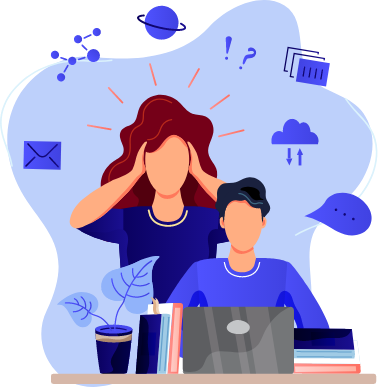
2. Do maintain some distance.
Try not to constantly (or even sparingly!) comment on your children’s social media profiles. Doing so embarrasses many kids. You risk driving them underground to other accounts or platforms. Give them plenty of space.
3. Remind your teenagers that stuff stays online for a long time.
College officials and employers might have access to older pictures and posts, even these supposedly deleted. Ask that your kids wait a few seconds and not post anything in the heat of the moment. Some parents call this the “Grandma Test.” If it’s something your kids wouldn’t want Grandma to see, they’re better off not posting it.
4. Accept that mistakes are bound to happen, and evaluate how realistic your rules are.
When your teenagers screw up big time, it can be hard to refrain from shouting at them or saying, “I told you so!” Feels good in the short term, but in the big picture, it pushes your child into secrecy.
Try to stay as level-headed and nonjudgmental as possible. For instance, sexting is normal to many teens, even straitlaced ones. Ordering them not to sext is akin to commanding them to not have sex. It’s not the most realistic demand.
You can, of course, express the hope that your teens not sext, but outline precautions in case they do. The advice could include:1
- Not showing their face and not showing identifying marks such as tattoos
- Quickly deleting any sexts they receive
- Never asking for sexts
- Not forwarding or showing sexts to anyone
Teens sext for a wide variety of reasons such as love, peer pressure, desire to fit in, experimentation, and pride in their bodies. These underlying causes deserve a lot of attention, too.
In a similar vein, you may prefer that your kids not look at porn. However, they probably will (and before they become teenagers!).2 Get ahead of it by discussing sex with them, or ask another trusted adult in their life to do it. Talk about topics such as intimacy, consent and its ongoing nature, respect, rape, healthy relationships, and the expectations that porn can create. These conversations can be awkward but are more effective than meaningless bans.
5. Check that your kids have balance in their lives (in other words, that they engage in offline activities or can self-regulate their online use).
It is not necessarily a bad thing if your teenagers are online a lot. Many naturally gravitate online for socializing and hobbies such as gaming, art, or coding. Plus, the COVID-19 pandemic complicated teenagers’ ability to go to school in person and see friends.
All that said, higher social media usage seems linked to increased rates of depression.3 The possible reasons are plentiful. Here are just a few:

- People see others’ “shiny” lives online and feel bad or inadequate in their own lives.
- Teens may get less sleep (or less quality sleep) due to being on the phone.
- Too much time online causes teens to neglect in-person friendships and pursuits.
- People have less time for physical activities and nurturing new skills and talents.
- The dopamine bursts associated with notifications and text messages satisfy in the moment but don’t add up long term.
- Children/teens might not fully develop the ability to focus or concentrate on homework and projects if they constantly check their phone or get interrupted by notifications.
- Cyberbullying is easier to do online than in person.
Parents can instill self-confidence and balance into their children’s lives with activities such as camping, sports, martial arts, theater, cooking, you name it. It’s easier the earlier you start, but the teenage years are not too late to get going. Other tips:
- Lead by example with your own balanced life. Hold phone-free dinners and activities. Stand your ground even if the kids complain.
- Give your kids regular alarm clocks for waking up—no phone alarms.
- Make a rule that kids can’t use their devices for one hour (or whatever time frame you prefer) before bed and overnight.
- Make available a variety of offline activities for your kids to do that strengthen their self-confidence and allow them to socialize.
- Chat with your teenagers about the pros and cons of social media. Urge them to be mindful. Be honest about how much of a time suck it can be and how it makes people feel. Maybe you enjoy keeping in touch with relatives who live far away, but social media can make you feel depressed, sad, unhappy, jealous, competitive, etc. Being honest and vulnerable encourages your kids to open up truthfully, too. Work with them to find alternatives to the time they spend on social media if it’s taking too much time or making them feel depressed.
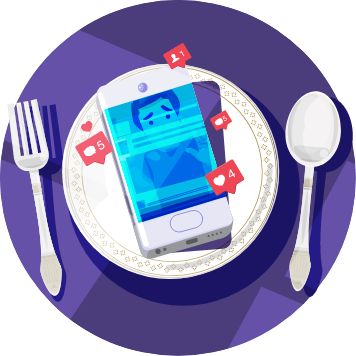
6. Emphasize the importance of data privacy, and acknowledge the convenience vs. privacy tradeoff. Explain what you do in your own life.
Some parents are very private with their data online and expect their kids to follow in their footsteps. Other parents are loosey-goosey with their data yet expect their teenagers to regulate their own behavior much better. The disconnect in the second situation can cause kids to not take their parents’ advice seriously.
- If you’re relaxed about sharing your data, own that decision and tell your kids that it does come at a cost. You want them to be aware of what they’re potentially getting into.
- If you keep a tight lid on the data you share, it may be unrealistic to expect your teenagers to do exactly the same.
Your kids need the “why” behind you urging them to read privacy policies before agreeing to anything. Ditto if you ask them to set high privacy settings and limit the information they give out. Even if you trod this ground when your kids were younger, do it again. The information is worth repeating.
| Recommendations to Teenagers | Why |
|---|---|
Undershare, not overshare. Leave as many fields blank as you can. Fill out the minimum necessary to use an app. Delete apps if you stop using them.
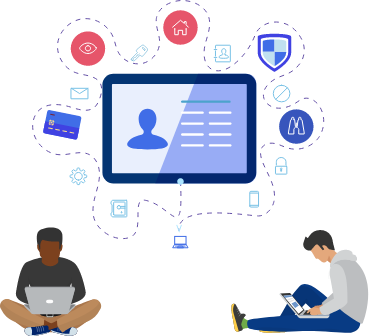
| To lessen hacking opportunities, creepy, overly personalized ads, and the info that companies keep on you.
Many apps, games, and websites, both free and paid, make money from collecting and selling data. You can’t use them unless you agree to have your data collected.
The user info stored can include names, email addresses, residential addresses, current geolocations, and even religious beliefs. Facebook, Instagram, Tindr, and Grinder keep tabs on employment and pet ownership stats, for example. Meanwhile, Credit Karma and Instagram are among the companies asking about your weight.4 |
Check data permissions on your phone. On iPhones, go to Settings and Privacy. Review privacy settings for camera, calendar, location services, etc. On Android phones, go to Apps & notifications then Advanced app permissions. | It’s always good to know which programs track you. |
Meet in public for the first time. | No matter how safe or “boring” someone seems to be, better safe than sorry. Meet online friends in public when other people are around. |
Avoid giving out full names, addresses, passwords, etc., to online friends. | Identity theft can mess with you big time. People online may be thieves, scammers, catfishers, or otherwise not who they say they are. (It’s also good to be careful about sharing passwords and financial info with in-person relatives and friends.) |
The Current COPPA Law, Simply Stated (Plus Some Background)
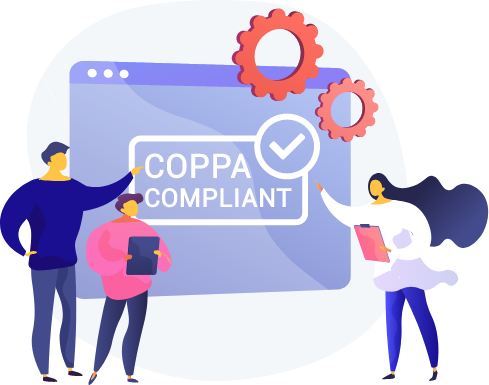
COPPA is supposed to protect younger kids by keeping their personal information under wraps, but it often fails. Here’s a common situation: Your kids want to get on the newest, hottest social media platform. They check a box attesting they are at least 13 years old (never mind that they’re 10). Done, they have an account. A lot of their information gets fed to advertisers and other companies.
Many times, kids create these accounts and lie with their parents’ knowledge or even encouragement. It’s convenient for kids to have these accounts, and parents assume the age requirement has to do with maturity when it’s actually about the private information being collected.
Another all-too-common situation: Your under-13 kids are honest about their age, but the website never gets your consent for their information to be collected and shared (COPPA requires this). The website then collects information it is not supposed to. This likely happened with TikTok.5
You can also look at COPPA this way: All kinds of information is fair game for websites and advertisers to collect as long as someone is 13 or older. It’s possible that hundreds of companies know all types of things about your teenager, which is an unsettling prospect. Likewise, your teen is agreeing to all kinds of terms, probably without fully understanding them.
COPPA passed in 1998 and took effect in 2000. It was passed because companies were collecting and using a bunch of information on children. Many of these kids were too young to distinguish between ads and regular content, and to understand the potential consequences of their data being collected. In one illustrative experiment, a TV reporter assumed the alias of a child killer and requested from a data firm the names, phone numbers, and addresses of thousands of children. The request was fulfilled.6
Selected Excerpts from “Adolescents and Social Media: Privacy, Brain Development, and the Law” (Journal of the American Academy of Psychiatry and the Law)
“A lawyer with expertise in COPPA law explained that age 13 was selected ‘because it was felt that kids over this age were tech savvy enough to understand the ramifications of providing information to third parties.’ However, the assumption that adolescents age 13 and over do understand and consider the potential consequences of posting personal information online is not well supported.” 7
“U.S. laws recognize that adolescents cannot contract like adults, but allows them to do the equivalent of entering into a contract by engaging in social media and other online communications.” 7
“Although adolescents have generally reached analytic maturity by their mid-teens, their still-developing experiential systems are particularly susceptible to social and emotional factors (e.g., peer pressure, romantic attachment), and their capacity for behavioral self-regulation is incomplete.” 7
“When faced with the decision of whether to agree to the terms of service of a social media website, an adolescent is able, and likely, to click a “yes” box without logical reflection (and very often without reading the terms to which they are agreeing), without consultation with an adult, and without considering the potential risks of online communication.” 7
COPPA covers two areas:
- Website and online service operators that specifically focus on children younger than 13
- Website and online service operators that collect information on kids younger than 13 years old
To get around COPPA, some websites don’t market their products or services to the younger set, or they post language saying that they’re not for users under 13 years old. That isn’t always good enough. Suppose you run an educational app that focuses on teaching math to elementary school kids. You must still follow COPPA even if you post language along the lines of, “You must be at least 13 years old to use this app.” Kids younger than 13 are clearly your target users.
Anyway, let’s look at how the FTC defines a website or online service.8
Considered a Website or Online Service for COPPA Purposes
- Plug-ins
- Ad networks
- Social networking apps
- Network-connected games
- Apps with behaviorally targeted ads
- VOIP (voice-over internet protocol) services
- Smart toys, internet of things devices
6 Steps a Business Should Take with COPPA8
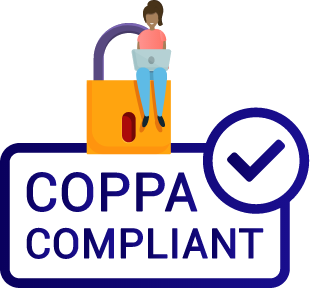
1. Assess whether it collects personal information from children younger than 13
- It still counts if the data collection is optional
- Personal information includes names, addresses, SSNs, photos, telephone numbers, and geolocation
- If the answer is yes, the other steps apply
2. Post a COPPA-compliant privacy policy
- This policy must be easy to see, read, and find
- It must be in the kids section if the website is general audience with a kids’ area
- The policy must include a list of parents’ rights
3. Inform parents through direct notice before collecting data on their children
- Direct notice must include links to the website’s online privacy policy and explain how parents can give their consent
- It must tell parents that the website obtained their contact information for the purposes of giving consent
4. Receive provable consent from parents to collect data on their children
- Methods may include knowledge-based questions hard for young children to answer correctly, a toll-free call, signed consent form, or credit card payments that notify parents
5. Respect parents’ ongoing wishes on the information collected
- Companies must accommodate parents who ask to review the information collected, to have their child’s information deleted, or who want to stop further collection
6. Safeguard children’s private information through reasonable means
- Companies should choose third-party service collaborators who are trustworthy. Companies should not ask for more information than is necessary.
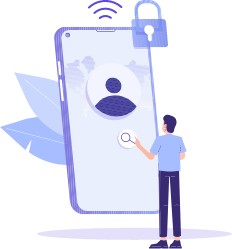
Enforcement of COPPA
COPPA enforcement is spotty. Companies can get fined for violating regulations, but experts say these fines are small when compared with the egregiousness of the violations. For instance, the $170 million fine slapped on Google and YouTube seems low, considering their revenues and the fact that they used cookies to target young children with ads.9
Put another way, businesses might just build COPPA fines into their costs. If a company’s pockets are deep enough, why worry about violating COPPA? It can pay the fines and still mine kids for information.
In general, courts are allowed to find companies liable for up to $43,792 per COPPA violation.10 They must have actual knowledge that users are under 13, for example, collecting a birth year indicating a younger age despite the user checking a box saying they are older than 13. To report violations, submit your complaint on the FTC site or call (877) FTC-HELP. If you want individual help and follow-up info with your complaint, go through your state attorney general’s office.
What Kids Can Do Online at 13 (That They Couldn’t at 12 due to COPPA)
Can Do
- Sign up for Facebook, Instagram, TikTok, and most other general audience social media sites and chat services
- See iffy or questionable content on the sites mentioned above
- Form contracts to take part in online activities even though they cannot consent to purchasing tobacco, alcohol, property, etc.
- Keep most social media accounts even if their parents prefer them to delete said accounts
- Create and manage their own Google accounts (although they can give their parents permission to supervise)11
- Submit their own requests for photos and videos to be removed (see Facebook screenshot below)

Can’t Do
- Join WhatsApp (age 16 minimum, although kids may lie about their age to get on)
- Make purchases on Amazon until 18 unless with the involvement of a parent or guardian
California does have legislation that goes past COPPA. The California Consumer Privacy Act of 2018 works to safeguard the data of kids in the state under 16 years old. For example, these minors or their parents must consent to the sale of data being collected and have the right to know what data is being collected.12
The Privacy Rights for California Minors in the Digital World applies to minors living in California. It requires that users younger than 18 be allowed to remove their posts from a website if they want. Websites must provide clear directions for how to do so.7 The law also doesn’t allow advertising of alcoholic drinks, some dietary supplements, lottery tickets, tobacco, and other products.
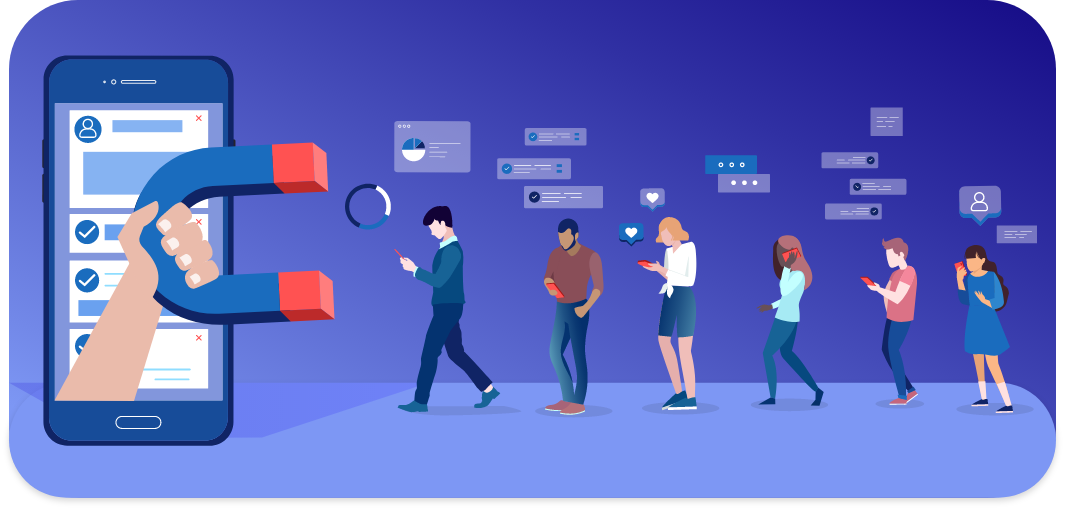
What General Audience Websites Can and Can’t Do under COPPA
General audience websites (and games, apps, etc.) are aimed at users 13 and older. However, these websites might still collect kids’ information, whether knowingly or unknowingly. Here’s a look at what these sites can and can’t do.
Can Do
- Screen users by age and deny access to those saying they are under 13 (or whatever designated age)
- Collect the information of 10-year-olds who lie about their age, saying they are 15, 25, or 35
- Collect the information of users 13 and older
- Close someone’s account and delete all the person’s data after receiving knowledge the user is a child 12 or younger
- Hold minors 13 and older responsible for agreeing to the terms of service
- Choose to treat older teens differently than adults (for example, Facebook limits dating features for teens and doesn’t allow certain types of advertising)
Can’t Do
- Use language for their age gate that tempts children to lie
- Offer a back button on the age gate for users to change their age
- Target younger children and protect themselves with language such as, “This site is not for users under 13 years old.” One example would be an ecommerce shop that encourages young children to create shopping carts and share their wish lists with family and friends. Another would be a general audience business running online ads that try to entice first graders to click on them. (Some businesses and educational apps label themselves as general audience, anyway. Outcomes vary. As mentioned above, COPPA enforcement is a mixed bag. Your complaint may or may not get followed up on.)
Parenting 13-Year-Old’s Internet Activities
Websites generally are not required to verify users’ ages as long as users indicate they are 13 or older (or whatever designated age or older; dating websites are among those that may set older age limits). If your children have fudged their age to get an email account or social media profile, COPPA may not make much difference at, say, age 10 versus age 13. Keep that in mind if data privacy matters a lot to you or to them. If your child is under 13, COPPA lets you contact the company and request a review of the information collected and ask that it stop or be deleted.
Of course, many parents worry more about whether their children are emotionally and mentally capable of using the internet. COPPA leaves a dubious legacy here since it implies children come of internet maturity at 13. They don’t! Their brains still have a lot of growing to do even as they gleefully plumb the newest social media sites. Parents must keep open lines of communication and help their teenagers find or maintain balance in their lives.
References and Footnotes

- Scheff, Sue. (2020, March 04). Help! My Teen Is Sexting! Family Online Safety Institute. Retrieved March 25, 2021, from https://www.fosi.org/good-digital-parenting/help-my-teen-sexting
- Kislin, Nancy J. (2020, Nov. 22). Blurred Lines: Consumption of Viewing Porn Affecting Kids? Psychology Today. Retrieved March 25, 2021, from https://www.psychologytoday.com/us/blog/family-and-trauma/202011/blurred-lines-consumption-viewing-porn-affecting-kids
- Miller, Caroline. (n.d.). Does Social Media Cause Depression? Retrieved March 25, 2021, from https://childmind.org/article/is-social-media-use-causing-depression/#
- Atamaniuk, Mary. (2020, Oct. 14.) Which Company Uses the Most of Your Data? Clario. Retrieved March 25, 2021, from https://clario.co/blog/which-company-uses-most-data/
- Spangler, Todd. (2020, May 14). TikTok Is Still Violating U.S. Child-Privacy Law, Groups Charge. Variety. Retrieved March 25, 2021, from https://variety.com/2020/digital/news/tiktok-is-still-violating-u-s-child-privacy-law-groups-charge-1234606854/
- Largest Database Marketing Firm Sends Phone Numbers, Addresses of 5,000 Families with Kids To TV Reporter Using Name of Child Killer. (1996, May 13). Business Wire, EPIC. Retrieved March 25, 2021, from https://epic.org/privacy/kids/KCBS_News.html
- Costello, Caitlin R., et al. (2016, September). Adolescents and Social Media: Privacy, Brain Development, and the Law. The Journal of the American Academy of Psychiatry and the Law. Retrieved March 25, 2021, from http://jaapl.org/content/44/3/313
- Children’s Online Privacy Protection Rule: A Six-Step Compliance Plan for Your Business. (2017, June). Federal Trade Commission. Retrieved March 25, 2021, from https://www.ftc.gov/tips-advice/business-center/guidance/childrens-online-privacy-protection-rule-six-step-compliance
- Don’t Weaken Privacy Protections for Children. (2019, Oct. 10). The New York Times. Retrieved March 25, 2021, from https://www.nytimes.com/2019/10/10/opinion/coppa-children-online-privacy.html
- Complying with COPPA: Frequently Asked Questions. (2020, July). Federal Trade Commission. Retrieved March 25, 2021, from https://www.ftc.gov/tips-advice/business-center/guidance/complying-coppa-frequently-asked-questions-0#B.%20COPPA%20Enforcement
- Golgher, Paulo. (2018, Sept. 18). Helping More Families Set Digital Ground Rules with Family Link. Google. Retrieved March 25, 2021, from https://www.blog.google/technology/families/helping-more-families-set-digital-ground-rules-family-link/
- Privacy Matters: Protecting Digital Privacy for Parents and Kids. (2019). Common Sense Media. PDF. Retrieved March 25, 2021, from https://www.commonsensemedia.org/sites/default/files/uploads/kids_action/csm_privacymatters_protecting_digital_privacy.pdf
Additional Resources

Yes, Your Child Will Be Exposed to Online Porn. But Don’t Panic — Here’s What to Do Instead. Advice for a variety of situations (factsheet here)
Children's Online Privacy Protection Act (COPPA): Cases, news, and resources on COPPA
Common Sense Research: Reliable data and useful tips for parents of children of all ages


